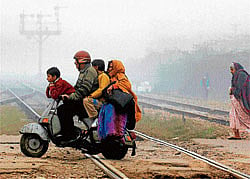About 1,300 people were killed on the rail tracks in the capital last year, run over by trains while crossing the lines and in mishaps at unmanned railway crossings.

The figures with Delhi Police add up to 1,358 deaths in 2011 on the tracks and at railway stations.
“While 95 per cent of these deaths were accidents, five per cent were natural deaths,” Additional Deputy Commissioner of Police (Railways) Bhairon Singh Gurjar told Deccan Herald.
But there has been a 9.4 per cent decline in deaths on the railway system in the city, compared to 2010 when 1,500 people lost their lives.
Most of the victims last year were identified. “The unidentified victims are kept for few days at the mortuaries. When no one come forward to claim them despite the advertisements, we record the identification marks and take pictures and then send the bodies for the last rites,” said Gurjar.
Police said that maximum number of deaths were reported from the Subzi Mandi-Badli-Narela sector, mostly of people crossing the tracks. “After that, Old Delhi to Shahdara lines are more prone to accidental deaths,” said Gurjar.
In the New Delhi railway station zone 200 people died, 517 people lost their lives in the Old Delhi station area, 223 around Hazrat Nizamuddin, 319 around Sarai Rohilla and 99 around Anand Vihar.
The Indian Railways and Delhi Police have conducted several awareness programmes to avoid such accidents. Northern Railway spokesman S K Sharma mentioned measures like organising street plays, putting up sign-boards at unmanned crossings and drivers being asked to blow train horns when they approach the crossings.
“Awareness through SMS is also being done. Around 50,000 SMS asking people to be alert were sent across Delhi,” he said.
“There are several slums that surround the tracks. The rail traffic on these routes are very heavy. People need to be extra alert as even a minute of laxity could prove fatal,'' he added.
“People using earphones while crossing rail tracks is turning out to be another new cause for such accidents,'' he said.
Last April, a Shatabdi Express mowed down two schoolgirls, one of whom was reportedly busy talking on her cellphone.
At places the railways authorities have erected walls on both sides of the tracks, but local people sections of them to make it easier to take shortcuts. “If railway tracks at densely populated areas are wired or walled, many deaths could have been avoided,” said a senior police officer.
Trespassing is a punishable offence under Section 147 of Indian Railway Act.
The offender can be fined up to Rs 1,000 or imprisoned for a period up to six months or both. “However, around lakh of people in the national capital flout the law,” said the officer.
